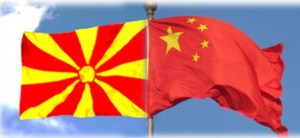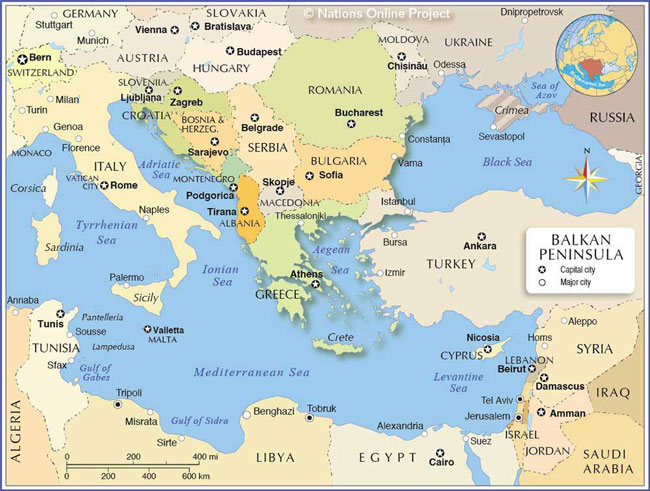New Start for Northern Macedonia, Name Change Promises Balkan Belt and Road
 The historic summit between Greece and Macedonia, involving a name change for modern times for the latter, is likely to renew Chinese interest in investing in the country and the Balkans as a whole.
The historic summit between Greece and Macedonia, involving a name change for modern times for the latter, is likely to renew Chinese interest in investing in the country and the Balkans as a whole.
The change of name – still to be ratified, but now well on the way – to “The Republic of Northern Macedonia – clears up territorial concerns Athens has had since the break up of Yugoslavia and the emergence of a new Macedonian country – possessing almost the same name as the northern Greek Province, which includes the strategic port of Thessaloniki. By describing itself as “Northern Macedonia”, the Skopje government recognizes there is no claim on more southern Hellenic lands. In doing so, it also potentially opens up Northern Macedonia as a country to a whole new era of trade and investment. That includes potential membership of the EU, now that Greece will no longer block such a move.
The government of the country, based in the old Yugoslavian city of Skopje, has stated its support for China’s Belt and Road Initiative. Speaking at a conference in October last year in Ohrid, Macedonian President Gjorge Ivanov said that Macedonia supports the China-proposed Belt and Road Initiative’s contribution to peace, prosperity, openness, innovation, and links between civilizations. The Belt and Road Initiative “offers opportunities to fund major infrastructural projects in the region helping its economic development”. Ivanov said. He also mentioned several fields where Macedonia offers investment opportunities.
China has had an eye on the Balkans for some time as the region offers strategic access to the EU, which in turn has embraced the region but been shy of offering membership. While the Balkans is ringed by EU member states (Bulgaria, Croatia, Greece, Hungary, Italy, Romania, and Slovenia), none of the so-called Western Balkans Six (WB6) – Albania, Kosovo, Northern Macedonia, Serbia, Montenegro, and Bosnia and Herzegovina – are part of the EU. WB6 members are involved instead in the so-called Berlin Process, a series of annual summits, which started in 2014 and aim to reaffirm the region’s European perspective by improving regional cooperation, economic growth, and political stability.
Five WB6 countries, with the exception of Kosovo, are members of the Southeast European Cooperative Initiative (SECI), while only Albania is a member of NATO. Adding to the complexity, Russia still wields significant influence in the Western Balkans, mainly because most countries in the region remain dependent upon Russian natural gas deliveries. Notably, Moscow has refused to recognize Kosovo as an independent state. With regard to China’s role, Beijing has always pursued a strategy of building political support among a large number of relatively small developing countries. The area of the Western Balkans is no exception, though the regional context clearly needs to be factored in, and that will almost certainly involve consultations with Russia, who may also wish to push their own Eurasian Economic Union. Macedonia is then about to become sought after both as a free trade prize and strategic connectivity asset between Europe and Eurasia.

It helps to some extent that Northern Macedonia borders Greece. The Northern Greek seaport at Thessaloniki can be used to receive goods from the main seaport of Piraeus near the Greek capital of Athens – already heavily Chinese invested. China has transformed Piraeus into the Mediterranean’s busiest port, investing nearly half a billion euros through the state-backed shipping conglomerate Cosco. It intends to make Piraeus the entry point to Europe under its Belt and Road Initiative. Chinese goods would travel along a new network of railways and roads fanning out among the Balkans. Cosco incidentally now controls the entire Pireaus waterfront through a 67 percent stake.
From there shipping can be forwarded to Thessaloniki, then transit via road and rail further north to Northern Macedonia and into Kosovo, Albania, Montenegro, and the EU’s Bulgaria. Further afield lie Bosnia, Serbia, and another EU prize in Romania.
Opportunities then will begin to appear in Thessaloniki as well as Northern Macedonia, Albania and beyond. It will only be a matter of time before the WB6 announce plans, along with Chinese financial support, to develop improved Balkans rail and road connectivity to the southern EU. Other investors should be looking at logistics, transshipment, storage, and professional services to smooth the way for the already existing Piraeus “Dragon Head Into Europe” to start reaching into Northern Macedonia and beyond.
About Us
Silk Road Briefing is produced by Dezan Shira & Associates. The firm advises foreign investors and governments on their Asian and Belt Road strategy, possessing 28 offices throughout Asia and via numerous partner firms throughout Europe. For assistance please email us at silkroad@dezshira.com or visit www.dezshira.com
 Related Reading:
Related Reading:
![]() China Moves in on Balkans after EU Promotes “Connectivity” rather than Membership
China Moves in on Balkans after EU Promotes “Connectivity” rather than Membership
![]() China Targets, Funds, and Incentivizes Eastern Europe as Bilateral Trade Potential Intensifies
China Targets, Funds, and Incentivizes Eastern Europe as Bilateral Trade Potential Intensifies
Silk Road and OBOR Business Intelligence
Dezan Shira & Associates´ Silk Road and OBOR investment brochure offers an introduction to the region and an overview of the services provided by the firm. It is Dezan Shira´s mission to guide investors through the Silk Road´s complex regulatory environment and assist with all aspects of establishing, maintaining and growing business operations in the region.






